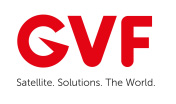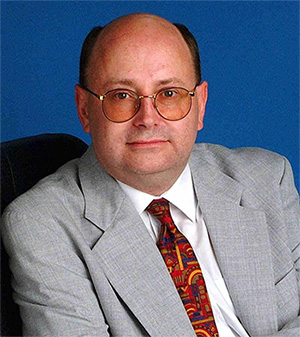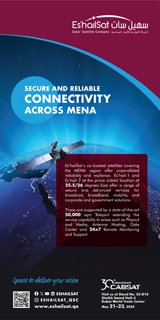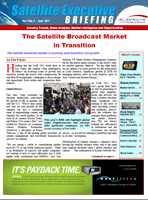Industry Leadership Through Innovation
by Martin Jarrold
 London, UK, July 15, 2019--GVF is driven by innovation on behalf of the satellite communications industry; innovation for its member organizations in particular. GVF’s partner organization, SatProf, is the leader in satellite industry training. The Informa Telecoms & Tech Academy is the leading training partner to the TMT industry. Together we have developed and announced the launch of the Satellite Industry MicroMBA, and, what’s more, it’s available at a 20 per cent discount for GVF Members.
London, UK, July 15, 2019--GVF is driven by innovation on behalf of the satellite communications industry; innovation for its member organizations in particular. GVF’s partner organization, SatProf, is the leader in satellite industry training. The Informa Telecoms & Tech Academy is the leading training partner to the TMT industry. Together we have developed and announced the launch of the Satellite Industry MicroMBA, and, what’s more, it’s available at a 20 per cent discount for GVF Members.
GVF Training courses and certifications are the established global standard for satellite communications skills, covering operation, installation and maintenance of VSAT, marine, and mobile/SNG satellite terminals, in addition to general and specialized satcom theory. Students learn, practice, and are evaluated on their knowledge and skills with online, self-paced, interactive, simulator driven training modules developed by SatProf, Inc.
The Telecoms & Tech Academy, as the leading training partner to the TMT industry, has trained more than 30,000 professionals and 500 businesses globally. The Academy was born out of the telecoms industry to elevate understanding of the challenges the sector is facing through a training portfolio which continues to evolve to address new and emerging skills gaps the telecoms & tech sector is facing.
The Satellite Industry MicroMBA is tailored for mid-to-senior managers wanting to improve their quantitative business case evaluation skills and further their understanding of the complete satellite industry business model. By evaluating topics from industry best practices to the changing digital landscape this course will help delegates identify opportunities and provide understanding on how to overcome key challenges. Following the format of the successful Telecoms MiniMBA, this two-day program provides a practical guide to best practice and a roadmap for success. The course is based on industry excellence and it will help attendees to find the right balance between technology, strategy, organization and culture and to commit to a strategic plan that meets strategic and commercial objectives.
 Complete with practical exercises and real-life scenarios, the Satellite Industry MicroMBA will provide delegates with a critical understanding on the key competency areas required for success within the satellite industry and enable them to make more informed and commercially viable strategic decisions. Business simulation is the vehicle through which the course maximizes competency development, ensuring that ideas on strategic implementation can be tested and appraised.
Complete with practical exercises and real-life scenarios, the Satellite Industry MicroMBA will provide delegates with a critical understanding on the key competency areas required for success within the satellite industry and enable them to make more informed and commercially viable strategic decisions. Business simulation is the vehicle through which the course maximizes competency development, ensuring that ideas on strategic implementation can be tested and appraised.
The benefits of attending the program include:
- An understanding of the relationship between technical viability of a satellite network and its profitability to evaluate and build competitive businesses
- Enhanced development of clarity and unity throughout the organization – allowing better alignment of KPIs, performance and focus with overall strategy.
- Enhanced development of new business models and identification of areas for future competitive advantage.
- Enhanced development of the knowledge to impact strategic debate and contribute actively to technology, financial, management and marketing decisions.
- The capability to discuss with confidence the emerging dynamics of the satellite market and wider technology ecosystem.
- Development of the skills needed to be a driver for industry best-practice.
The Approach
The Satellite Industry MicroMBA is a highly interactive two-day program, giving participants the opportunity to directly apply the lessons learned to their own organizations by combining:
- Online preparatory learning
- Teaching
- Team exercises
- Business simulation with special software tools
- Group discussion
- Workshops
- Practical application of the theory to the business
Organizational alignment, accountability, and a results orientation are stressed in each session. All interventions are hands-on working sessions designed to create not theory, but practical, business building plans and skills that will have an immediate and positive effect on participants’ businesses with a tangible return on investment.
The Program Modules
The GVF Training module GVF 500: Introduction to Satellite Communications is to be completed online prior to attendees undertaking the Satellite Industry MicroMBA. GVF 500 covers: The history of satellite communications; Satellite applications; Wireless concepts; Orbits and launches; Spacecraft technology; Satellite links; Network technologies; Ground equipment for GEO/GSO satcom; Satellite Industry Structure; Horizontal markets; Regulatory issues; and, Comparing satellite with alternatives technologies.
The face-to-face aspect of the Satellite Industry MicroMBA program is co-located with the VSAT Global & Next Generation Satellite Applications conference, 16-17 September 2019, but will take place in the classroom training facilities at the InformaTech headquarters at the Blue Fin Building, 110 Southwark Street, London. At the start of the two-day session the online course will be reviewed and there will be opportunity for joint discussion and questions before the MicroMBA program.
Face-to-Face Training
Composition of the classroom training is as follows:
(1) Business Environment & Industry Outlook
Program objectives; Introduction of the business simulation; Comprehensive overview of the technology and business of satellite communications; Key elements of the satellite industry business environment; The view of shareholders, operators, vendors, service providers, and the customer; The changing and increasingly complex interrelationships between the different players.
(2) Strategic focus on Technology
History, launchers, orbits, frequencies, networks, equipment, bandwidth, applications and industry structure; Challenges and opportunities facing the industry over the next few years; Future trends, growth markets and the technology strategies that are likely to be employed; Updates and research drawn from GVF and Ovum’s vast market intelligence resources.
(3) Global Regulation & Financial Trends
Regulatory issues, frequency bands & regions; Slot allocation & coordination ‘Open Skies’; Earth station licenses; Regulated performance specifications; Type approvals & homologation; Satellite operator verification & type approvals; Band sharing with fixed & mobile communications; Radiation safety regulations; Network licenses & local regulations; License fees, financial models & industry trends.
(4) Change Management & Digital Leadership
Fundamental concepts about digital leadership; The relationship between digital leadership, innovation & change management; The core competencies of effective digital leadership & how organization personnel measure up; Developing digital culture across the organization, & aligning separate departments with cross function teams to break the silo effect; How to create the conditions for innovation & digital transformation; Examples of leading successful organizational transformation & what we can learn.
(5) Marketing & Customer Experience
Marketing principles; Marketing channels; Positioning, Segmentation & Branding; Promotion; Distribution; Wholesale; Sources of competitive advantage; Building market based sustainable competitive advantage; Customer Proposition – Building life-time customer value; Satellite links.
A Case Study
Modern satellite communications technologies enable a wide range of services and business plan choices, but at the core, every successful satcom business must reconcile service revenues against CAPEX and OPEX. To lay the groundwork for students to successfully participate in complex markets and diverse industry segments, students will start by developing a simplified but consistent business/technical business case for a hypothetical satellite Internet service provider company.
Students will learn the fundamental building blocks of a satellite ISP business, including gateway stations, operations centers, connectivity, remote terminals, and space segment, and how to size them for functionality and capacity. They will then use that knowledge, together with an interactive simulator app designed specifically for the MicroMBA course, to analyze the required CAPEX and OPEX, estimate revenues, ROI, and profitability. Working in teams, students will optimize the elements of their business, draft a business plan, and present it in a “shark tank” format to the participant group.
For more information please contact me at martin.jarrold@gvf.org or Ralph Brooker, President, SatProf, Inc at ralph@satprof.com
-----------------------------------------
 Martin Jarrold is Senior Vice-President of International Program Development of GVF. He can be reached at: martin.jarrold@gvf.org.
Martin Jarrold is Senior Vice-President of International Program Development of GVF. He can be reached at: martin.jarrold@gvf.org.





